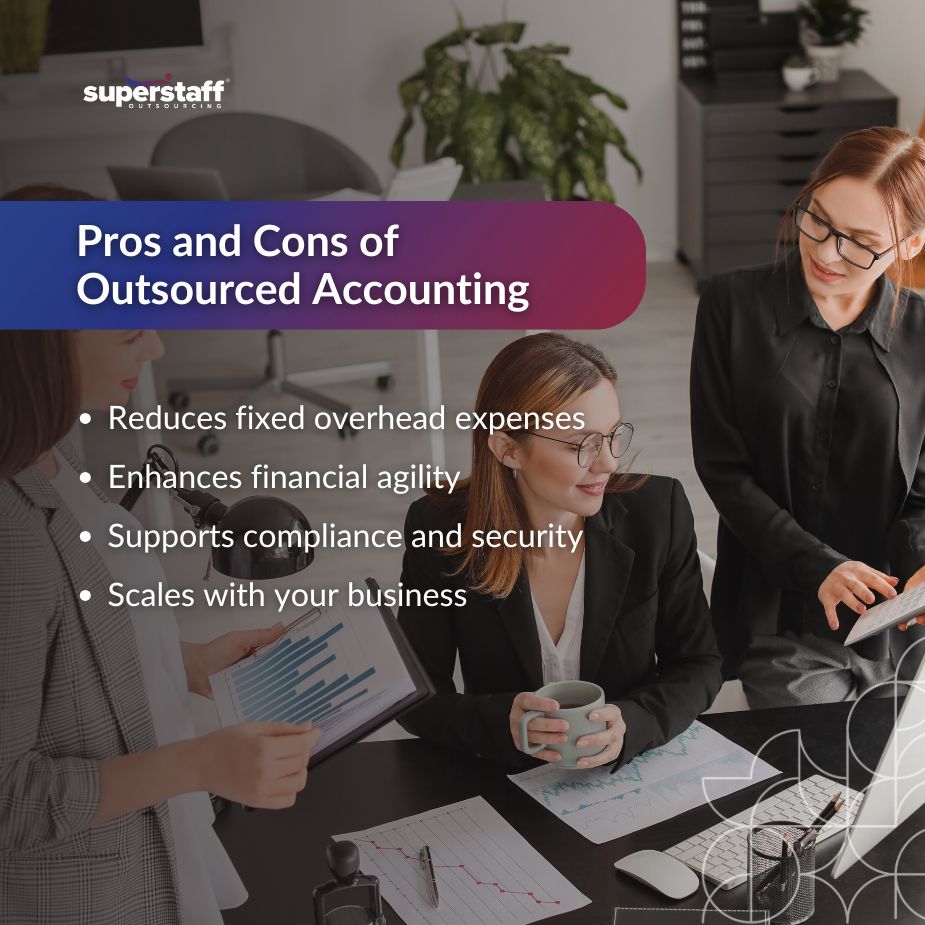
Accounting is essential to keeping your business running smoothly. But the way you manage it—whether in-house or through a partner—can either support or stall your growth. Many small to mid-sized companies are now weighing their options more carefully, especially when it comes to getting the most value for their investment.
In this article, we compare the benefits, risks, and practical realities of both models to help you decide what works best for your operation. We’ll explore the pros and cons of outsourced accounting to give you a well-rounded, decision-ready perspective.
What’s the Real Difference?
Choosing between in-house and outsourced accounting starts with the basics. In-house accounting means your financial team is made up of direct hires. You control the workflow, daily schedules, and how tasks are done. Everything stays within the company walls—from payroll to tax prep to reporting.

Outsourced accounting means you work with an external provider. That provider handles the same tasks, but often with more specialized talent and standardized processes. The pros and cons of outsourced accounting here boil down to control versus capability. In-house teams give you more oversight. Outsourced teams give you broader expertise and the ability to adjust quickly without the headache of hiring.
This shift in control is the beginning of the decision-making process for most businesses. While it’s reassuring to see your team at work, it can also limit your flexibility, especially when business demands change fast. That’s where outsourcing begins to shine—when what you need isn’t always what your internal structure can handle.
How Much Does It Really Cost?
Cost is one of the most common reasons leaders explore outsourcing. And for good reason. Salaries, benefits, onboarding, software licenses, compliance training, and equipment all stack up quickly with an in-house model. And those costs don’t pause when your needs slow down. Whether it’s tax season or not, your full-time staff requires full-time compensation.
Outsourcing takes those expenses off your plate. You pay for a service package, and your provider delivers results. For companies looking for cost savings with outsourced accounting services, this model creates financial predictability and often trims unnecessary overhead. The pros and cons of outsourced accounting become especially clear when comparing annual spend.
Some may argue that having internal staff ensures better alignment with company culture. That can be true in tight-knit teams. But financially, outsourcing offers greater scalability without the financial drag of full-time hires. And as we’ll explore next, scalability is more than just a budget issue—it’s a growth strategy.
Can Your Accounting Grow with You?
Scalability is often overlooked—until it’s too late. Your business might be small today, but what happens when it expands? When you open another location? When investor reporting becomes necessary? Suddenly, your in-house setup may no longer be enough.
One of the strongest pros and cons of outsourced accounting is the ability to scale fast. Need to double your support during tax season? Done. Expanding to new states or countries? Your provider already knows the rules. Outsourcing lets you grow without delay, which is vital when opportunity knocks and time matters.
In contrast, scaling an in-house team takes months. Hiring, onboarding, training, and syncing with company systems take time. And when people leave, you lose momentum. Outsourcing, on the other hand, offers a plug-and-play expansion model. You gain access to more expertise, more tools, and fewer delays—all without a steep learning curve.
What About Compliance and Risk?
The compliance landscape is always shifting. From tax laws to data privacy regulations, even small missteps can lead to fines or legal trouble. In-house teams are often left to figure these changes out on their own, relying on internal training or external consultants to keep up.
With outsourcing, compliance is usually built into the service. The pros and cons of outsourced accounting become evident again here. You lose some internal oversight, but you gain a dedicated team whose full-time job is to stay on top of regulations. That’s especially useful when you operate across state lines or in highly regulated industries.
Many outsourced providers also offer financial reporting and compliance outsourcing as part of their core services. This not only simplifies your workload but also reduces risk. Rather than reacting to changes, you get proactive updates and strategies that keep your company protected. In-house teams may struggle to keep up; outsourcing teams are built for it.
Are You Keeping Up with Tech?
Modern accounting isn’t just about crunching numbers—it’s about using the right tools. Cloud-based software, real-time dashboards, automation, and even AI are transforming how financial data is managed. Companies that fall behind on tech risk falling behind in performance too.
Outsourced providers often come equipped with cutting-edge tools and platforms. It’s part of their business model to stay ahead. The pros and cons of outsourced accounting from a technology standpoint favor outsourcing heavily. You don’t need to buy new software, train your staff, or worry about IT compatibility. Your provider brings everything to the table.
In-house teams, on the other hand, may rely on outdated tools due to budget constraints or internal approval processes. Adopting new technology can take time and cost more than expected. Outsourcing gets you there faster—and usually with better support and integration. For businesses looking to stay modern, this tech-forward advantage is a big reason to make the switch.
Which Model Fits Your Business Best?
Your business size, stage, and structure all influence the right choice. If you’re a small or mid-sized firm with limited bandwidth, outsourcing can fill critical gaps and offer high-quality service at a predictable cost. If you’re growing rapidly, outsourcing is one of the fastest ways to keep accounting aligned with your business expansion.
Of course, larger enterprises may still benefit from in-house teams—especially when tight integration with other departments is required. But even they can gain by outsourcing specific functions or seasonal needs. A hybrid model often works best, blending in-house management with external execution.
The pros and cons of outsourced accounting shift depending on your company’s context. That’s why it’s not about one being better than the other. It’s about what fits your current needs and long-term goals. And in most dynamic environments, the flexibility, speed, and efficiency of outsourcing deliver a competitive edge.
Why Scalability and Flexibility Matter
Today’s business landscape demands adaptability. Regulatory updates, investor expectations, cross-border expansions, and digital transformation all require a finance team that can keep pace. That’s difficult with fixed internal resources.
Outsourcing solves for this by being inherently flexible. It adapts as your needs change. It also brings consistency. Providers have backup staff, training programs, and system redundancies to ensure continuity—even during peak seasons or emergencies.
The pros and cons of outsourced accounting again lean in favor of external providers when business needs fluctuate. You don’t just save costs—you gain consistency and resilience. This is particularly true when your company is transitioning from a startup phase to a more mature operation. External support smooths that growth curve.
What About Data Security and Confidentiality?
One concern many leaders raise is security. Giving access to sensitive financial data to a third party sounds risky. But today’s providers know this concern well. Reputable firms use secure platforms, follow global data protection standards, and offer contracts with clear confidentiality clauses.
In-house teams can also pose risks, especially if internal controls are weak or if there’s staff turnover. Again, the pros and cons of outsourced accounting depend on the specifics. But with the right partner, outsourcing doesn’t mean giving up control. It means gaining professional-grade protection without managing it all internally.
In fact, many outsourced firms operate under tighter security frameworks than small companies can implement themselves. When choosing a provider, it’s essential to ask about certifications, audits, and system access—but in most cases, you’ll find they’re well-equipped to protect your data.
Final Word: The Pros and Cons of Outsourced Accounting
The debate between in-house and outsourced accounting isn’t about right versus wrong—it’s about fit. In-house accounting gives you control, internal alignment, and cultural familiarity. But it comes with fixed costs, slower scalability, and potential tech and compliance gaps.
Outsourcing offers flexibility, specialized knowledge, faster turnaround, and access to digital tools you may not be able to afford internally. Throughout this blog, we’ve explored the pros and cons of outsourced accounting—from cost and compliance to scalability and security.
Ultimately, outsourcing wins for companies focused on growth, adaptability, and efficiency. And if you’re one of those businesses, SuperStaff is here to help. We offer tailored accounting services that scale with your company, giving you the expertise you need without the overhead you don’t. Let’s talk about building a financial operation that works for today—and prepares you for tomorrow.






